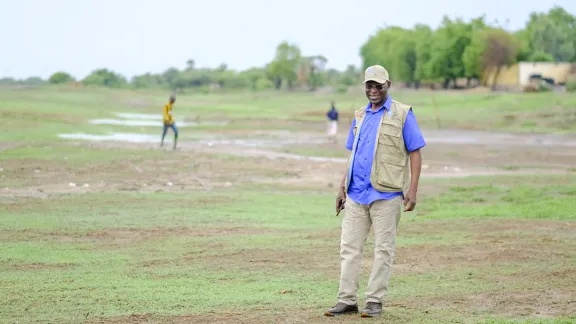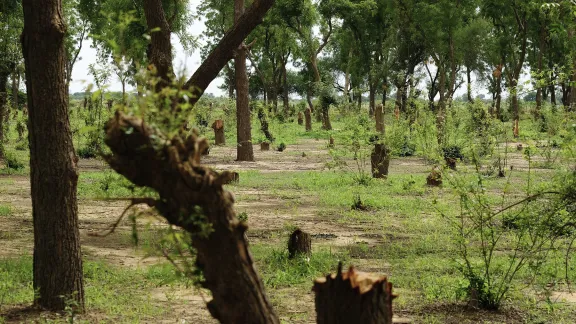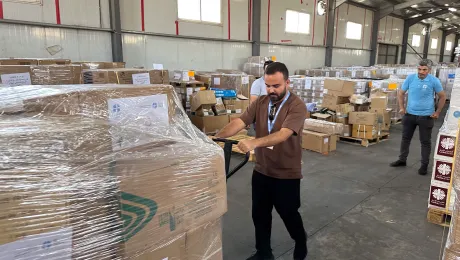LWF Chad Program Coordinator Mathieu Idjawo talks about the recent visit to a community close to the border between Cameroon and Chad, and the challenges of reforestation

Mathieu Idjawo, Program Coordinator for LWF Chad, on a field visit to Mandalia (Chad) on July 15, 2024: Funded by GAC, the "Gender Transformative Climate Adaptation" is implemented by LWF in the Lake Chad Basin, covering regions in both Cameroon and Chad. Photo: LWF/M. Renaux
It takes a village to save the trees
We just visited an agroforestry project that started many years ago in Logone Birni-Kousseri, in the Far North province of Cameroon. In this region, Cameroon borders Nigeria to the east and Chad to the west. Attacks by the Boko Haram military group have displaced the local population.
The local community is composed mainly of the Arab Choa ethnic group, which hosts many returnees and internally displaced persons. They mostly live off livestock breeding and agriculture. The Samakale site is near the border with Chad, and it is easy to access by crossing the Logone River. Often, families live on both sides of the river, some members in Cameroon and some in Chad. During inter-ethnic clashes that occurred in 2022, the Blama (their local chief) was killed, and until now, he has not been officially replaced.
Illegal tree cutting
We went to the Samakale forest. The government planted it in the 1970s and gave it to the community around 2000. The Forest Law of 1994 allowed populations to participate in forest management. But as we saw, the forest is poorly managed. This is a problem because these trees are not easy to regrow.
The Far North region has a hot and dry climate with very little rain. The trees in this forest are neem trees. They provide shade and can live off very little water. The community uses them for firewood, and their bark, leaves, and seeds contain biochemicals that can be used as insecticides.
However, the trees need to be cut down when they are 15 years old. Otherwise, they will not grow back. The community received the forest after the ideal time for cutting had passed. Many trees in this forest were cut too late and did not grow back, and this practice continues until today.

Illegal tree cutting has shaped the Samakale forest for decades. Photo: LWF/ M. Renaux
People from Chad also cross over and cut the trees. Regulations preventing illegal tree-cutting are strongly enforced in Chad compared to Cameroon. But people in Cameroon also illegally cut down trees, even if some people go to jail for it.
The day before, we had talked to the local minister of forestry about this reforestation project and some of its concerns. The official told us that in the beginning, men were cutting the trees. But when the government started jailing the men, the community began to send women to fetch the wood because women rarely face prison sentences for this kind of offense. The authorities fear being accused of harassment if they arrest women. Now, it's mainly women who are (illegally) felling the trees. According to the official we met, 70 % of the trees planted initially have been destroyed.
We discovered that for successful reforestation, we need to consider the trans-border aspect and the frequent interactions between Chad and Cameroon.
– Mathieu IDJAWO, LWF Chad Program Coordinator
Changing behavior, adding skills
Our project is about changing the community's behavior. We plan to sensitize and train them so they know the appropriate time to cut the trees so the trees can grow back. We also plan to discuss with them so-called nature-based solutions to decrease the excessive use of firewood. These solutions could be ecological charcoal or improved stoves.
As I mentioned, the forest primarily consists of neem trees, whose seeds are used for oil extraction and leaves for making biopesticides. Our project aims to enhance the community's knowledge and skills in these processes. Additionally, the neem tree bark is occasionally used for medicinal purposes by the local population.
When the site was identified at the start of the project, we knew little about it and its history. We discovered that for successful reforestation, we need to consider the trans-border aspect and the frequent interactions between Chad and Cameroon.
We also need to consider local habits and the total adherence of the community and propose alternative sources of energy and other income sources for the people who so far have been living off cutting the trees and selling the firewood. This is a complex process that we can only achieve by working closely with the community and the local authorities.


